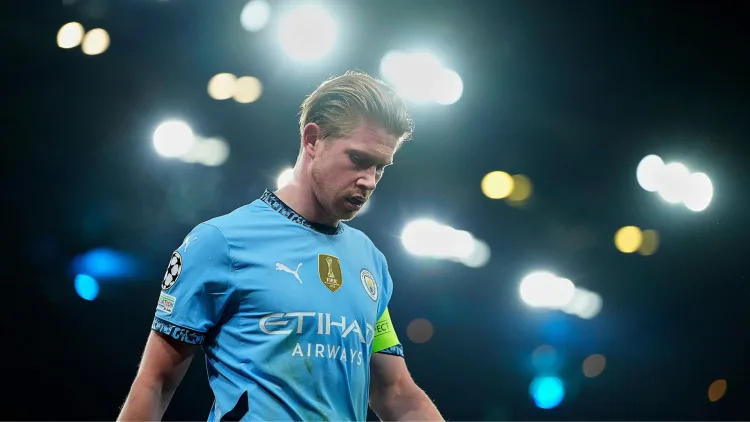Kevin De Bruyne will be 34 in June. It’s been a career of over 750 games across club and international football across the last fifteen years. It has numerous highs and he will go down as, undoubtedly, one of the most talented midfielders ever to play in the Premier League.
But it’s a testament to the modern game that such a cerebral footballer is going to be left looking at his transfer options at the end of this season, and it’s a clear lurch in the wrong direction for football.
We’ve largely made our peace with the No.10 position, which used to host Juan Roman Riquelme, Francesco Totti and numerous other geniuses, being replaced by robust midfielders and ultra-quick wide players better at running than they are at kicking. But we’re leaning ever more into a sport which is now more NFL than soccer.
We’ve also got an organisation which lionises destructive players, generally has one star dictating the play and has wide receivers – wingers – who get the ball fired into their path to run onto. Like the NFL.
We’ve got hyper-tactical elements to the style of play which dictates virtually everything anyone does in attack, defence, or even in conventional set-pieces, where those types of coaches have become famous in their own right. Like the NFL.
We’ve got a whole host of talented but largely transient pros that might be remembered for a moment but will likely be forgotten over time as they lack the longevity to be truly great. Like (most of) the NFL.
And we’ve got an entire division of athletes earning way too much for them to moderately care much about motivation, legacy, or longevity. Like the NFL.
It’s obviously not a perfect example in that one sport is fluent and one is built around individual plays, but they have more in common than you think.
De Bruyne has become outdated
There is, unfortunately, not much room for any nuance or indeed anyone who plays between what used to be ‘the lines’, because if a team is set up against a low block, they largely feel like their attacking tactic has failed. Breaking down a defensive tactic just isn’t something that most teams or coaches want to even attempt any more.
It’s got to be fast, and it’s got to be in transition, and it’s got to be with the quicksilver, trickiest wingers in order to get it done, of which there is an abundance.
And at times that can be fun. But a guy like De Bruyne, even at the pinnacle of his athletic career, feels like an anachronism for where football’s ‘collective ahead of the individual’ aspect is going.

Like goalkeepers who can’t pass the ball, KDB’s position has been retired, and we’re facing a reality where a playmaker whose crossing and passing range that can create chances from nothing is, at the moment, deemed too risky for City and maybe for most other teams in Europe.
It’s where we are. As Duncan Castles and I discussed on the Transfers Podcast around the January window, the average age of Premier League signings in the space of two years has fallen from 22.5 to 19.5. Teams want to sign teenagers because they offer lower risk, generally come cheaper, and provide an element of sell-on value down the line.
KDB offers none of those things. He’s no longer an ‘asset’ as modern clubs would see him. He is a salary risk. He can’t play 90 minutes. He can’t play twice a week. He can’t press, he can’t track back. Whether or not any of these things are true, it’s just where the market has positioned him.
Does he have more to offer? In a normal football environment, of course. And it would be a horrible indictment of where we are should he go to either MLS or Saudi Pro League when he still has something to give.
“It was brief,” he said of negotiations with City over a new deal. Is this where we are now?
The FootballTransfers app
Check out FootballTransfers’ new app for all of football’s big storylines, transfer rumours and exclusive news in one convenient place directly on your mobile device.
The FootballTransfers app is available on Google Play and in the Apple App Store. Download here:





